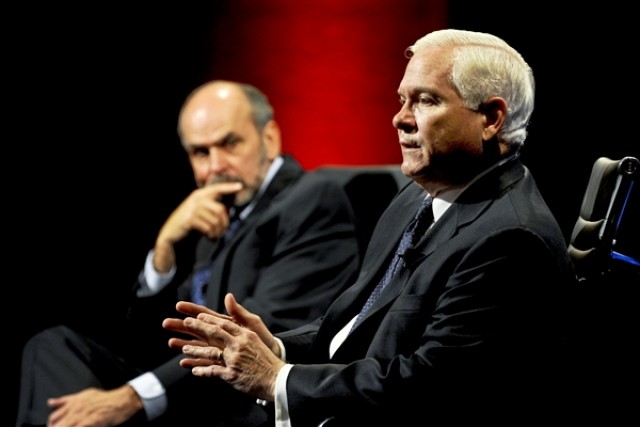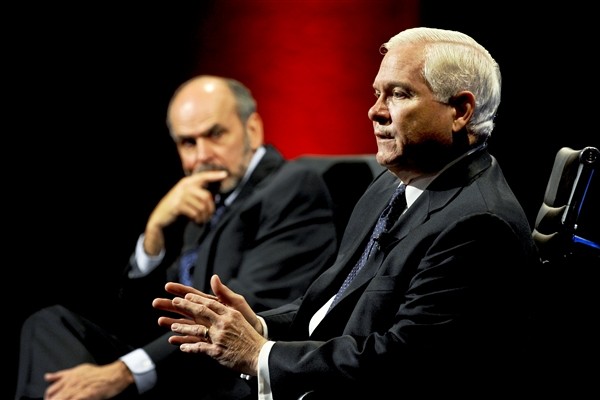WASHINGTON (Nov. 16, 2010) -- Even in a time of budgetary constraints, the United States must maintain its military might to address the security challenges of today and the future, Defense Secretary Robert M. Gates said today.
"Given the security challenges that the U.S. is likely to face around the world -- and the unfortunate reality that most of our allies are reducing their militaries -- the burdens on us and the security challenges are going to remain unchanged and potentially even increase in the future -- therefore, the need to sustain force structure," he said.
Speaking at the Wall Street Journal's CEO Council here, Gates said he is sympathetic to the challenges caused by the federal deficit, but warned against drastic cuts to the military.
"If you cut the defense budget by 10 percent, which would be catastrophic in terms of force structure, that's $55 billion out of a $1.4 trillion deficit," he said. "We are not the problem."
The secretary addressed recommendations from the National Commission on Fiscal Responsibility and Reform, which has recommended cutting defense procurement by 15 percent and its research and development by 10 percent. The commission also recommended freezing non-combat military and civilian pay. President Barack Obama appointed Erskine Bowles and former U.S. Sen. Alan Simpson to co-chair the panel in April. They presented their report last week.
Gates called the commission's recommendation to slash the defense budget "math, not strategy."
"Frankly, the idea that defense would take half of the cut in discretionary spending, particularly given what we're trying to do in terms of preserving security, is a problem," he said.
The secretary has launched his own initiative to cut overhead costs and allow the services to keep the savings to re-invest in the needs of troops. The department needs to maintain about 3 percent real growth in capabilities in order to sustain the present force structure, he said.
"What we are trying to do in the Department of Defense is figure out how you kill programs that aren't working," Gates said. "How do we develop the broadest capabilities for the widest range of scenarios, and sustain the strength this country needs' That means going in with a scalpel instead of a meat axe and figure out how we do business."
Gates said he aims to take $100 billion out of overhead - the "tail" - and re-invest it in the "tooth side" of the department. He said he's gotten the cooperation of the services by reassuring them that they can re-invest the savings.
"So what the Navy finds in savings, they can apply to ship building," he said. "The same way with the other services."
The secretary also said he hopes to find between $15 billion and $20 billion in savings outside of the military services that he can then reinvest in the services.
"I think that has incentivized the services to really look very hard at the way they do business," he said. "This isn't a matter of doing the same things we're doing with 10 percent less money. It's figuring out new ways to do business."
Gates also addressed some of the security threats the nation faces today and may face in the future.
On Afghanistan, the secretary addressed media reports of tension between Afghanistan President Hamid Karzai and U.S. and NATO leaders.
"President Karzai is our partner," he said. "He will be the president of Afghanistan until his second term is out in 2014. We will continue to partner with him through this conflict."
Gates said he believes Karzai's recent comments about increasing Afghan control of security shows the leader's frustrations with three decades of war.
"I think President Karzai is reflecting the impatience of a country that's been at war for 30 years," he said. "I think what President Karzai was articulating was the desire to see Afghanistan get to the point where it was in the 1950s and '60s when the primary American presence was a development presence. We were building roads. We were putting in irrigation systems."
"We share that desire," he added. "The problem is, we can't get from here to there tomorrow."
Gates said he expects NATO to address the issue of transitioning security to the Afghans at its summit in Lisbon later this week. NATO "probably will embrace President Karzai's own stated goal of having a transition of responsibility for security complete by 2014," he said.
The secretary added that Afghan security forces already are playing a significant role in their country's security. In one of the most aggressive operations, in Kandahar, Afghans account for 60-75 percent of the security forces and are leading the operation, he said.
On Pakistan, Gates said the government has exceeded his expectations in its decision to focus its military on the Taliban insurgency.
"If you had told me two years ago that Pakistan would have 140,000 troops on its western border fighting the Taliban and the various other terrorist groups that are in that area, I would have thought that impossible," he said.
"If you had told me again two years ago that they would have occupied Swat and south Waziristan and be going after these people, be working with us, and partnering with us as we coordinate on both sides of the border, I would have thought that was a reach," he said.
Gates said he believes Pakistan changed course against the Taliban because of strategic discussions with U.S. and NATO leaders that have built a relationship of trust and a "common understanding of the mutual threats that we face."
On Yemen, Gates said that country, as well as Somalia and other parts of north Africa, have become terrorist havens as operations in Afghanistan and Pakistan have caused the terrorist movement to "metasticize" to other areas. The United State's best tool in Yemen is forming a partnership with the government so it can defeat terrorism in its own country.
"We don't need another war," he said. "The Yemenis have shown a willingness to go after al Qaida on the Arabian Peninsula. They're working with us, with the Saudis, and with others.
"One of the big themes over the last couple of years for us has been what we call building partnership capacity, which is giving them the equipment and the training so they can do the job themselves," he added. "This is the theme behind a lot of our efforts in Africa as well as in the Middle East. That's our best tool."
On Iran, Gates said the world must keep political and economic pressure on the country to keep it from developing a nuclear weapons program.
"The only long-term solution in avoiding an Iranian nuclear weapons capability is for the Iranians to decide it's not in their interest," he said. "Everything else is a short-term solution, is a two-to-three year solution."
The secretary said he believes the current sanctions have been much harder on Iran than its leaders anticipated, and that they are "having an impact."
Gates said he does not believe a "military solution" is the right way to deal with Iran.
"If it's a military solution, as far as I'm concerned, it will bring together a divided nation," he said. "It will only make them absolutely committed to obtaining nuclear weapons and they will just go deeper and more covert. So I think the political-economic strategy is the one that we have to continue to pursue and ratchet up and create an exit for them."
If Iran builds confidence with the United Nations "then there is a way out of the box they've gotten themselves in," he said.
(AFPS Writer Jim Garamone contributed to this report).




Social Sharing